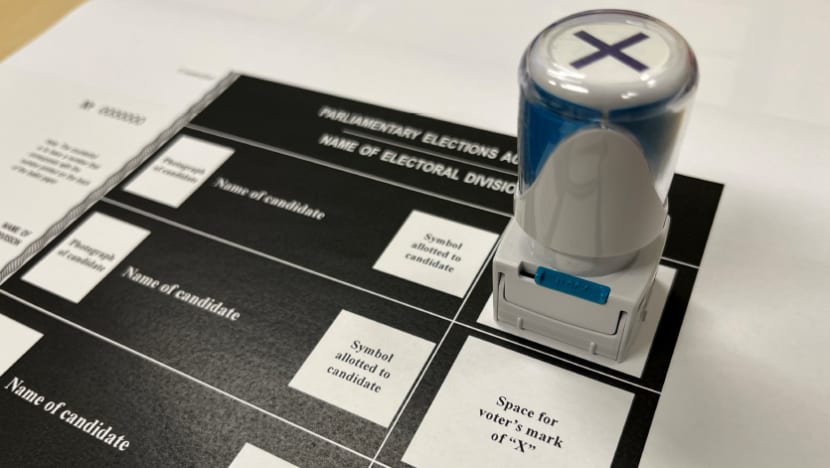New rules introduced for use of banners, posters during General Election
The area on the ballot paper for voters to mark their choice with the X-stamp has also been enlarged, said the Elections Department (ELD) on Friday (May 31).

A ballot paper and X-stamp. (Photo: Elections Department)

This audio is generated by an AI tool.
SINGAPORE: Under new rules on processes for General Elections in Singapore, political parties must declare the particulars of all banners, flags or posters bearing party symbols that were on display before the issuance of the writ of election.
Parties must make this declaration within 12 hours of the issuance of the writ.
The writ of election is the legal document that sets the election process in motion.
In a statement on Friday (May 31) outlining updates ahead of a General Election that must be held by November 2025, the Elections Department (ELD) also announced that the area on the ballot paper for voters to mark their choice has been enlarged.
This follows feedback from last September's Presidential Election that some voters were unsure if they had properly positioned the X-stamp within the demarcated area, said ELD.
These changes come into force on Jun 14. They are part of subsidiary legislation to the Parliamentary Elections Act, which was updated in 2023.
ELECTION ADVERTISING
The new rules on banners and posters fall under regulations governing traditional or non-online election advertising.
All declarations by political parties regarding banners, flags or posters will be made available online for public inspection.
During the campaigning period - which starts immediately after nomination proceedings end on Nomination Day and ends with the start of the eve of Polling Day - these banners, flags or posters can only be publicly displayed by authorised candidates, election agents or third parties and only in designated locations specified in the subsidiary legislation.
The Returning Officer can order any non-compliant banners, flags or posters to be removed. The Returning Officer is a public officer appointed by the Prime Minister to oversee the impartial and smooth conduct of elections.
Similarly with online election advertising (OEA), the Returning Officer can also make content publishers, including social media companies, remove election advertisements if it is in breach of election rules.
The Returning Officer can also direct content publishers to disable access to, and stop further communication of, such advertisement to Singapore end-users.
"Amplification of existing OEA (e.g. through boosting, reposting, sharing or resharing) will be subject to the same requirements as publishing new OEA," said ELD.
"Amplification of existing OEA increases the reach of the content to more users and has the same effect as publishing fresh content."
Most of the election requirements outlined on Friday are similar to those introduced for the 2023 Presidential Election.
These updates serve to enhance transparency and accountability, said ELD.
During the election period, election advertising will also be required to comply with published-by requirements to clearly display the full names of those who played a role in the advertising, and to use words such as "sponsored by" or "paid for by" in the case of paid election advertising.
The updated requirements specify that all paid election advertising will cover payments that are both direct and indirect, as well as monetary and non-monetary.
















